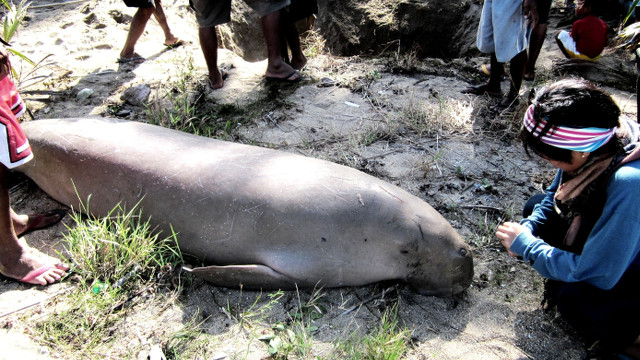SUMMARY
This is AI generated summarization, which may have errors. For context, always refer to the full article.

MANILA, Philippines – After a male dugong was found dead in Palawan on December 6, the Department of Environment and Natural Resources (DENR) is sending a team to conduct an investigation.
The 2.6-meter (8.5-foot) dugong was found lifeless by two fishermen in a seaweed farm in Barangay Cheey in the town of Busuanga. The dugong, classified as “critically endangered” in the Philippines, feeds on seaweed and is known to frequent seaweed farms in Palawan.
The sea mammal drowned after getting tangled up in a rope in waters around 7 meters deep, according to the dugong conservation group Community Centred Conservation (C3) Philippines operating in Busuanga.
“The dugong, just like the dolphin and whale, needs to surface for air periodically,” said Protected Areas and Wildlife Bureau (DENR-PAWB) chief Theresa Mundita Lim.
It is believed the dugong had been dead for more than 24 hours before it was found. The fishermen reported their discovery to the village’s Fisheries and Aquatic Resources Management Council. Local officials and members of C3 retrieved and buried the dugong to prevent the residents from eating its meat.
This is the second time this year that a dugong was found dead in Palawan. Earlier this year, another lifeless adult dugong was found in the town of Coron. Palawan is considered the “final stronghold” of the creature in the country.
More vigilance, protection needed
Lim called on the public to immediately report to the nearest DENR local office any sighting or stranding of dugongs and other marine wildlife for proper investigation and rescue.
She said the PAWB team and the Palawan Council for Sustainable Development (PCSD) will discuss ways to prevent similar deaths of protected wildlife.
Some of the measures being considered are an early warning system and protocol for the rescue and release of trapped dugong or other animals in fish cages and seaweed farms.
A more effective public awareness campaign is also necessary to enlist the help of locals who are usually the first to spot such incidents.
Dugongs are vital to the health of marine ecosystems. By feeding on seagrass, they help maintain the ecological health of seagrass beds which serve as food and habitat for other marine animals like pawikan (sea turtles) and small fish.
The dugong is listed by the International Union for the Conservation of Nature (IUCN) as a species “vulnerable to extinction” because of their slow rate of reproduction and unabated hunting of humans for its meat, oil, skin, and bones.
In the Philippines, it is protected by Republic Act No 9147 or the Wildlife Resources Conservation and Protection Act. Under the law, it is illegal to kill, hunt, trade, transport, or possess threatened species and products derived from them like meat, bones, ivory, skin, and others.
Violators face 6 to 12 years of imprisonment or a fine ranging from P100,000 to P1 million. – Rappler.com
Add a comment
How does this make you feel?
There are no comments yet. Add your comment to start the conversation.